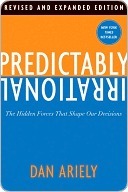More on this book
Community
Kindle Notes & Highlights
by
Dan Ariely
Started reading
July 22, 2020
This, then, is what we call arbitrary coherence. Initial prices are largely “arbitrary” and can be influenced by responses to random questions; but once those prices are established in our minds, they shape not only what we are willing to pay for an item, but also how much we are willing to pay for related products (this makes them coherent).
That our first decisions resonate over a long sequence of decisions. First impressions are important,
work consists of whatever a body is obliged to do, and that play consists of whatever a body is not obliged to do.”
the power of the first decision can have such a long-lasting effect that it will percolate into our future decisions for years to come. Given this effect, the first decision is crucial, and we should give it an appropriate amount of attention.
In other words, the sensitivity we show to price changes might in fact be largely a result of our memory for the prices we have paid in the past and our desire for coherence with our past decisions—not at all a reflection of our true preferences or our level of demand.
immensely more valuable than it really is. Why? I think it's because humans are intrinsically afraid of loss. The real allure of FREE! is tied to this fear. There's no visible possibility of loss when we choose a FREE! item (it's free).
Zero is a different place. The difference between two cents and one cent is small. But the difference between one cent and zero is huge!


